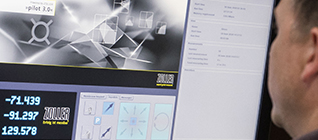The Choice of Finish
Mechanical Finishing
There are a variety of mechanical finishing processes which can enhance the aesthetic quality of castings, and in several cases these processes will also be used as a pre-treatment if the casting requires subsequent painting. For Sand castings, Shotblasting is often used to remove sand, and to provide an even surface finish whilst giving a good key for painting. In the case of Gravity and Pressure Die castings, Vibratory Finishing is the most efficient method for cleaning the castings, removing burrs and smoothing the surface. This provides a more pleasing casting finish and again is a good preparation for subsequent painting. To achieve a polished casting finish, a cheap and effective method is Ball Burnishing, which is often used on aluminium cookware and window furniture. Polishing provides an attractive finish for castings, but care must be taken in selecting alloys which have corrosion resistance appropriate to their destination environment.
Alochroming
Alochroming, or Chromating is a chemical treatment for Aluminium alloy castings, which involves immersion in chemical baths, spraying or brushing, with a solution that chemically reacts with the Aluminium to produce an etched surface or to form a chemically converted protective film on the aluminium surface. It can also be used as a pre-treatment for painting. The chemical conversion process gives decorative and corrosion resistant finishes, but for most applications they are generally too easily abraded to be of practical use alone. We offer Alocrom 1200, which produces an irredescent gold colour, and Alocrom 1000 which gives a light green colour. The finish is electrically conductive, and inexpensive to produce, making it ideal for large quantities of small items. With the recent introduction of the RoHS Directive, we are now encouraging customers to move to Trivalent Chromate equivalents of these products, which offer similar protection but with the use of fewer harmful chemicals. The principal Trivalent chromate we offer is Alocrom 407/47, which is a RoHS compliant equivalent to Alocrom 1200.
Electroplating
Electroplating is a process which is used extensively on Zinc and Copper alloy castings, and to a more limited extent on Aluminium castings, mostly for decorative purposes. The coatings used include Copper, Nickel, Zinc, Chromium, Silver and Gold. A high degree of surface soundness is required.
Powder Coating, Painting, Silk Screen Printing, Enamelling
Powder Coating is a low cost process for items requiring a high degree of impact and abrasion resistance. It is an electrostatic process where powdered pigment is sprayed from a gun and is electrically attracted to the component. The powder is then fused by heat in an oven. The resulting finish is tough and durable, and is available in varying levels of gloss and texture. It should however be borne in mind that masking on items to be powder coated is difficult and time-consuming (hence costly), and should be avoided if possible. Small surface blemishes which are not easily detectable on raw castings become much more noticeable after powder coating. Specialist powders are available for particular applications, including anti-bacterial coatings for medical applications, and anti-graffiti coatings for street furniture etc. For higher levels of surface finish, Wet Sprayed Coatings should be considered. Wet painting involves spraying a pigment suspended in a solvent onto a component, which must be rotated to give complete coverage. Proper surface pre-treatment and the application of a suitable primer such as Zinc Chromate is essential if the final paint coating is to be truly protective. Stove Enamelling temperatures are not usually high enough or of sufficient duration to influence the properties of Aluminium castings but should be taken into account with fully heat treated castings. Where it is necessary to add lettering or other artwork to painted castings, this can often be achieved by Silk Screen Printing.
Anodising
Anodising is an electrolytic process for producing a thick oxide coating on Aluminium. Anodising takes advantage of the natural oxide film that is formed spontaneously on the surface of Aluminium when exposed to the air. This natural oxide film, which is extremely thin, protects the underlying metal, giving its well known properties of resistance to corrosion. With time the film will go grey in colour which is acceptable in some applications, but not in situations which appearance is importance. In aggressive atmospheres the film can become sooty, and sometimes even powdery. Anodising thickens this oxide film electro-chemically to give a hard transparent coating, which greatly increases corrosion resistance and has the advantage of protecting any polished, chemically brightened, etched or similar surface finish. Unsealed anodic films are microporous and can be dyed. Sulphuric Acid Anodising is the most common form, offering an anodic film thickness of between 3 and 25 microns. Thinner films are ideal for decorative finishes, which can be dyed, etched or brightened to enhance appearance. Thicker films are appropraite for external applications where durability, corrosion resistance and wear are the main criteria. Chromic Acid Anodising produces anodic films of between 3 and 7 microns. It does not have such good wear properties, but is more ductile and provides a good key for paint and bonding. This finish is opaque in appearance.
Notes for Designers of Non-Ferrous Castings
DOWNLOAD NOW Guides
HOW can MRT Castings help you?
I want...
- Select what you need
- a complete solution
- to develop a new component from initial concept
- advice on what processes are best suited to my component
- prototypes before committing to production tooling
- to re-shore production to the UK from overseas
- a new supplier to use existing tooling
- to convert a machined from solid part to a casting
- a supplier who can meet stringent quality requirements
New at MRT Blogs
Visit us at stand C240 on the 4th, 5th & 6th of February 2025.
Read MoreMRT Secure Cyber Essential Plus Standard
17th Jul 2023
MRT Castings is proud to announce that it has achieved certification to the ‘Cyber Essentials Plus’ standard.
Read MoreAluminium diecasting specialists MRT Castings secured the prestigious ‘Company of the Year’ title at the recent UK Cast Metals Industry Awards 2022.
Read More




